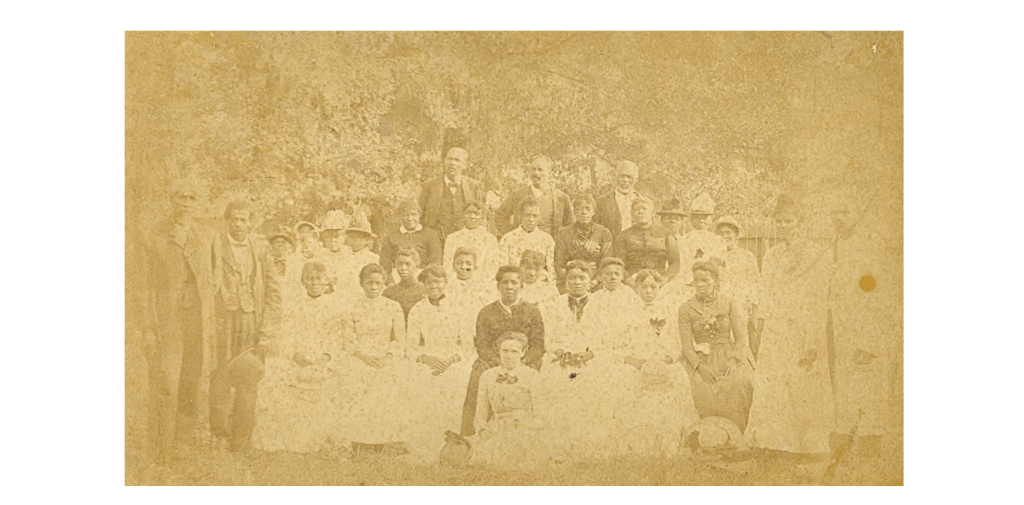Maj. Gen. Gordon Granger, commander of the Military District of Texas, solidified his place in history when he issued General Order No. 3 to free those enslaved in Texas. Even with the Emancipation Proclamation in 1863, and the end of the Civil War in April 1865, Granger led about 1,800 volunteer soldiers from the XIII Corps to deliver his order by both words and force in Galveston on June 19, 1865.
What started as a state holiday in Texas in 1866, Juneteenth (or, the 19th of June) is now federally recognized and celebrated annually. The holiday – also known as Freedom Day or Jubilee Day – observes the date when Granger’s orders established Union occupation in Texas and liberated those who remained enslaved in the state. Accounts from Texas at that time tell of erupting celebrations in the streets as General Order No. 3 was read in public places, including courthouses, churches and military headquarter facilities.
Pierce Harper, a man who was enslaved in northeast Texas, recounts the celebrations on June 19, 1865, in “Born in Slavery: Slave Narratives from the Federal Writers’ Project, 1936-1938.”
“When peace come [the army] read the ‘mancipation law to the cullud people and they stayed up half the night… singing and shouting,” he said. “They spent that night singin’ and shoutin’. They wasn’t slaves no more.”
Army Historian Nicholas Torre recently authored a Juneteenth information paper for the U.S. Army Center for Military History. He said, at the time, the Army was the only institution that could liberate those enslaved from bondage with the force of arms – and had the ability to ensure Southern revanchists didn’t reassert control immediately after the Civil War ended in April 1865.
“This is one of the brightest spots of the U.S. Army’s legacy,” Torre said. “Being able to say the U.S. Army was responsible for enforcing the Emancipation Proclamation — probably the single, most important document in American history after the age of the Revolution — is one of the things, as an institution, we should be most proud of.”
The people of Texas are informed that, in accordance with a proclamation from the Executive of the United States, all slaves are free. This involves an absolute equality of personal rights and rights of property between former masters and slaves, and the connection heretofore existing between them becomes that between employer and hired labor.
Granger wouldn’t have read the order himself, but Union troops — more specifically, Black Union troops — would’ve been the ones charged with delivering the message.
The National WWI Museum and Memorial in Kansas City, Missouri, is offering free admission on June 19 and 20, 2022, in commemoration of Juneteenth and their new exhibit “Black Citizenship in the Age of Jim Crow.”
Le’Trice Donaldson, an assistant professor of history at Texas A & M University-Corpus Christi, authored “Duty beyond the Battlefield: African American Soldiers Fight for Racial Uplift, Citizenship, and Manhood, 1870 – 1920.” She said Black soldiers occupying Texas during reconstruction was a deliberate action and as a result of a larger conversation and intel from Black communities.
“It was specifically Black soldiers who knew there were people in Texas that were pushing back against freeing [enslaved] Black people,” Donaldson said. “The volunteers who fought were very much focused on making sure every last person held in bondage was free, and that was an important part of their service.”
The ubiquitous talks also included how the Black community could guarantee slavery was going to end with the war. And, if they volunteered to serve, how they would assure compensation and institutions to support those who were freed. In his article for the “Journal of Black Studies,” Roy W. Copeland discussed the role the U.S. Army also played in the redistribution of land to freedmen with Gen. William T. Sherman’s Special Field Order No. 15 in 1865.
According to Copeland, Sherman met with Black leaders earlier that year who “informed him that land ownership was the best way for the freedmen to secure and enjoy their newfound emancipation.”
“The order reserved coastal land in Georgia and South Carolina for Black settlement, with each family receiving 40 acres,” Copeland said. “Special Field Order No. 15 would constitute the greatest land redistribution program ever benefiting African Americans in this country’s history.”
By mid-1865, 40,000 former slaves lived on 400,000 acres of the redistributed, coastal land until President Andrew Jackson, a known Confederate sympathizer, intervened and ordered the land be returned to its former owners less than a year later.
Intelligence from the Texas-Mexico border also played a factor in Maj. Gen. Philip H. Sheridan, commander of the newly formed Military Division of the Southwest, ordering Granger to occupy Texas. Torre added that Emperor Maximilian I was installed in Mexico by the French, and leveraged rebel soldiers in his tensions with the Union.
“This stemmed from the fact that a lot of these Confederate soldiers were fleeing into Mexico with their guns and ammunition,” Torre said. “A lot of these [Union] troops were being sent to the Rio Grande basically to send a message to Maximilian that he better drop his support for those Confederate soldiers that were fleeing into his territory.”
By January 1866, approximately 20,000 of the 26,500 soldiers who occupied Gulf states were Black. The transformation of the force can be attributed to Black regiments forming much later in the war; their white counterparts had been fighting for the past decade and the adjutant general had ordered them to redeploy within a few months.
At the same time, there was an immense recruitment effort from Black spiritual leaders for Black soldiers to join the force, which garnered an overwhelming response based on a collective decision.
“No one soldier’s individual service is just theirs, it belongs to the Black community,” Donaldson said. “Their service never really just belongs to them and they know that. So, it’s important to make that distinction regarding Juneteenth that Black soldiers were the ones to deliver that message.”

